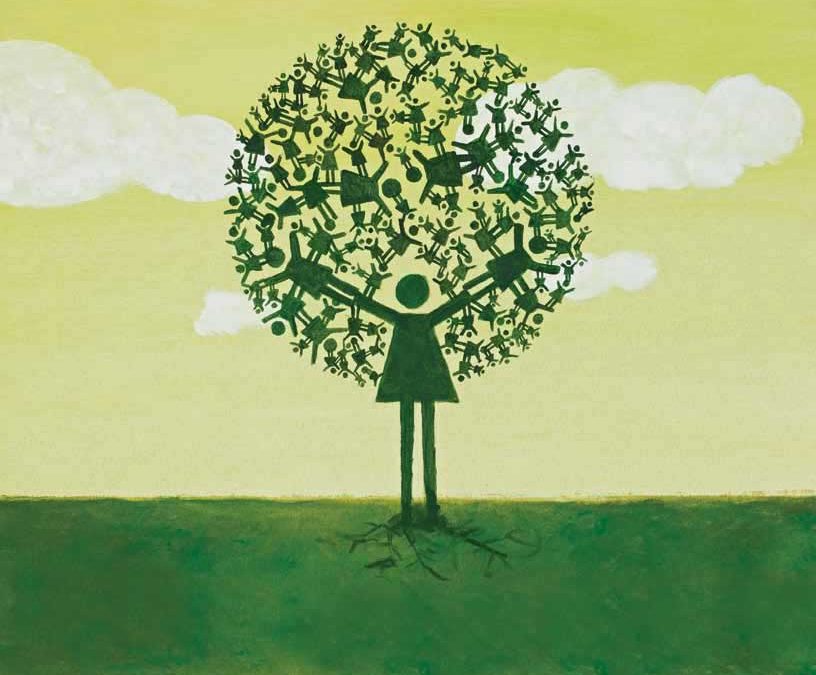by Angela T. Khabeb
I remember a conversation with one parishioner who made an appointment to meet with me in my office. She announced, “Pastor, I want to talk to you about the first sermon you ever preached here.” I couldn’t believe my ears. I asked for clarification. She repeated, “Yes, Pastor, your first sermon here.” I confessed that she would need to refresh my memory.
“Well, you know, you told us you wanted to lay down some ground rules—that you would be calling us sisters and brothers in Christ,” she said. “Well, I don’t like it. It makes me uncomfortable. I’m sure it is probably something cultural for you.” I recognized her candor as a teaching moment. I explained to her that it wasn’t cultural, but biblical.
“See, there was this guy named Paul,” I began. “He wrote about two-thirds of the New Testament. He was fond of using familial language.”
“Yeah, yeah,” she interrupted. “I know all that. It still makes me uncomfortable.”
Hmm, I thought to myself, maybe she just doesn’t like Paul? If so, I understood. After all, sometimes he got on my nerves, too. So I reminded her about Jesus’ own words.
“Remember when the disciples came to Jesus, and asked, ‘Lord, teach us how to pray’?” I asked. “And remember how Jesus said that when we pray, we pray in this manner: ‘Our Father…’? This, by definition, makes us brothers and sisters.”
Clearly she’ll understand now, I thought.
But she continued: “Yeah, yeah. I know all that. It still makes me uncomfortable.”
Realizing we were at an impasse, I put all my cards on the table, saying, “Well, I’m not going to stop.”
“I know. I know,” she said. “I just wanted to tell you how I feel.”
As I walked her to the door, I asked, “What would you like me to call you?”
“By my name,” she said. “Call me Mary Ann.”
Liturgy, scripture and design
That Saturday night, in the sanctuary, as I rehearsed the sung liturgy, I came to the words, “I greet you as your sister and God’s servant.” What? Wait a second. I realized suddenly that someone had stood at this altar and for decades declared this familial relationship. But now Mary Ann is uncomfortable? Suddenly it seemed that she could accept me as a pastor, but not as a sister, not even as a sister in Christ. I wondered what her own family was like. I wished I’d pressed her for more information during those moments.
God designed humanity to live in community. After all, we are created in God’s image, and our God exists in a divine community called the Trinity: God the Creator, Son and Holy Spirit. The Trinity continues to call us into a similar unity within the Body of Christ. Yet we stumble as we find our way to wholeness. And we are not alone. Holy Scripture is replete with broken relationships, sibling rivalry and family dysfunction. These are part of the human condition.
The writer of the book of Genesis introduces us to Adam and Eve, whose sons, Cain and Abel, are the quintessential definition of sibling rivalry. Burning with envy and resentment, Cain kills his brother Abel because God refused Cain’s sacrifice. Jealousy is a familiar foundation for sibling rivalry. But God is a source of hope amidst tragedy. Perhaps you are familiar with the story of Joseph and his coat of many colors. Joseph was his father’s favorite son, and “…when his brothers saw that their father loved Joseph more…they hated him” (Genesis 37:4). The resentment of these brothers ignites a deadly conspiracy, but Rueben, the oldest brother, thwarts their vicious plan to murder their brother. Joseph’s brothers relent, and instead of killing him, they sell him into slavery. Astonishingly, these siblings journey through a wasteland of jealousy, resentment and hate, to finally arrive at a place of forgiveness, restoration and reconciliation.
Most of us will never experience murderous plots or kidnapping conspiracies. Yet we often encounter deep divisions within our congregations and the body of Christ. Even though we tend to be more civil with our disagreements with our spiritual brothers and sisters, we may still become deeply disgruntled by an interesting array of concerns.
We argue over things such as whether to use carpet or tile for the floor in the narthex, whether to use white or red wine for communion, the proper way to slice pickles for a funeral luncheon and of course, whether to have traditional hymns or a praise band at worship.
The broader Christian family can also become deeply embroiled, sometimes over more serious issues impacting our nation, issues such as immigration, sexual orientation, racism and sexism. Yet through Christ, we always have a place of hope. To some degree, the body of Christ is both our blessing and our burden. Whether our relationships are completely caring or consistently complicated, we have hope, because ultimately we are defined first and foremost by our identity as followers of Jesus Christ. We are free in Christ, and our Christian freedom informs every facet of our lives. We are called to walk in mercy and love. Our Christian freedom empowers us to be intentional about the ministry of reconciliation. Joseph’s saga notwithstanding, our definitive example of what it means to be sisters and brothers of the faith rests with our savior.
The Rev. Angela T. Khabeb is an ELCA pastor. She has an amazing husband, Benhi, two spectacular sons, Konami and Khenna, and a precious baby girl, Khonni.


